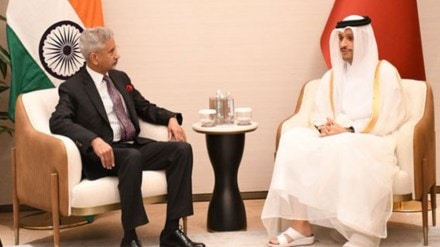The year 2025 kicked off with a high-profile diplomatic meeting in Doha, where India’s External Affairs Minister, S Jaishankar, met with Qatar’s Prime Minister and Foreign Minister, Sheikh Mohammed bin Abdulrahman bin Jassim Al Thani. This marks Jaishankar’s fourth visit to the Gulf nation, and with it, both nations are charting a course for deeper bilateral cooperation in trade, security, and regional affairs.
Pivotal Talks: Strengthening India-Qatar Relations
Jaishankar’s visit, which kicked off the first diplomatic engagement of the year, focused on expanding ties across a range of critical sectors—trade, investment, energy, and security. Bilateral trade between India and Qatar stood at a robust USD 14.08 billion in 2023–24, and the two sides are now looking to build on that foundation with future plans for enhanced cooperation. A joint working group (JWG) meeting is scheduled for 2025 in India, underscoring the importance both nations place on fostering strong economic and political relations.
India and Qatar’s growing strategic partnership goes beyond economics, as both countries are keen to deepen security collaboration. With tensions in the Middle East and the broader region, Qatar’s influence in global geopolitics is significant, and India is eager to align with its Gulf partner on key issues, including counterterrorism.
The Republic Day Question: Will Qatar’s Leader be the Chief Guest?
One of the most intriguing aspects of this diplomatic engagement is speculation around whether Sheikh Mohammed bin Abdulrahman bin Jassim Al Thani could be invited as the chief guest for India’s Republic Day parade in 2025. The invitation to the Republic Day chief guest is always a signal of the deepening of bilateral ties, and Qatar’s potential inclusion would be a notable development. It would further solidify the growing relationship between the two nations, making it one of the most anticipated diplomatic moments of the year.
The decision to extend such an invitation could signal India’s increasing emphasis on its ties with Qatar, a key player in the Gulf, and could potentially open the door for enhanced cooperation across multiple fronts.
Diplomatic Wins and Ongoing Challenges: The Case of Purnendu Tiwari
This visit also comes in the wake of a major diplomatic victory for India, when Qatar reversed the death penalty for eight Indian naval veterans earlier in 2024. Seven of these veterans returned home after high-level diplomatic efforts, including personal intervention from Prime Minister Modi. However, one former naval officer, Purnendu Tiwari, remains in Qatar under charges of espionage.
Tiwari’s case continues to be a point of contention. Recently, the former officer wrote a distressing letter to Indian officials, alleging torture and false accusations against him. His continued detention is a sensitive issue in India-Qatar relations and is expected to remain at the forefront of ongoing diplomatic discussions.
Jaishankar’s Diplomatic Strategy: A Year of New Engagements
His visit marks a significant moment in India’s foreign policy strategy for 2025. His discussions with Qatar’s leadership were not only about reinforcing the existing ties but also about aligning both countries on regional and global issues. In a post-meeting statement on ‘X’ (formerly Twitter), Jaishankar highlighted the comprehensive nature of their discussions, which covered political, trade, and security concerns, as well as key international developments.
Delighted to meet PM and FM @MBA_AlThani_ in Doha today. My first diplomatic engagement in 2025.
A productive review of our bilateral cooperation. Also a wide-ranging discussion on recent regional and global developments.
🇮🇳 🇶🇦
— Dr. S. Jaishankar (@DrSJaishankar) January 1, 2025
India’s engagement with Qatar has always been rooted in a shared interest in regional stability, and with Qatar’s influential role in the Middle East, India is keen to ensure that their strategic partnership continues to evolve to meet new global challenges.
Looking Ahead: 2025 as a Defining Year
As 2025 unfolds, India-Qatar relations are poised to enter a new phase. From trade and energy cooperation to security and cultural exchanges, both countries stand to gain from closer ties. The possibility of Qatar’s Prime Minister being invited to India’s Republic Day celebrations would be a powerful symbol of the ongoing partnership.
This diplomatic engagement also sets the stage for further negotiations on unresolved issues, particularly the case of Purnendu Tiwari. The year ahead offers plenty of opportunities for India and Qatar to not only address key challenges but also chart a course for a prosperous and stable future.
